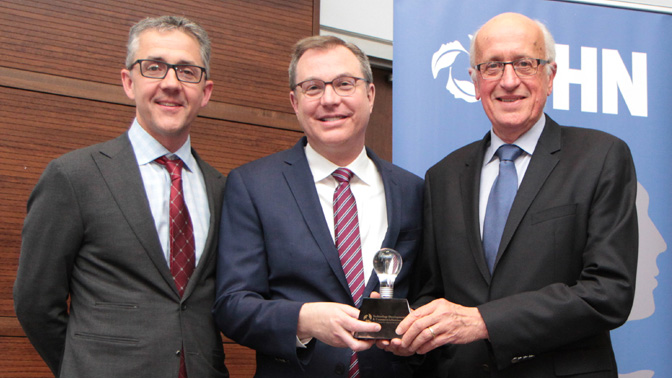
Drs. Gordon Keller and Michael Laflamme are co-winners of UHN’S 2017 Inventor of the Year Award for their pioneering contributions to the study of stem cells and the field of regenerative medicine.
Each year, UHN’s Technology Development and Commercialization Office (UHN-TDC) awards and celebrates a UHN Inventor who illustrates noteworthy excellence through inventiveness in research, critical contributions and commercial successes to impact patient lives and their quality of life.
Driven by the overarching goal of freeing patients from the recurrent toll of degenerative and chronic diseases, Drs. Keller and Laflamme have been pioneering and studying cell-based therapeutic approaches since the 1990s and the early 2000s, respectively, long before the field of cell-based therapy and regenerative medicine was formally recognized.
“Their bold achievements in pluripotent stem cell therapy have the potential to go beyond symptomatic treatment to discovering new therapies that promise to cure many chronic degenerative diseases,” said Dr. Brad Wouters, UHN Executive Vice President, Science and Research, in announcing the award at yesterday’s Annual General Meeting in the Auditorium at the MaRS Discovery District.
Regenerative medicine harnesses the power of undifferentiated cells to repair, regenerate or replace damaged or dysfunctional cells, tissues and organs.
“The burden of chronic diseases is gigantic,” says Dr. Laflamme. “And, we generally treat patients at the margin, treat symptoms only, and don’t address the fundamental degeneration of tissues and organs over time.”
But pointing to the potential of regenerative medicine, Dr. Laflamme adds: “Rather than a pill you have to take for the rest of your life to keep things from getting worse or to improve symptoms, you actually get at the root cause [and cure] the disease.”
Dr. Keller adds, that “the range of diseases that one can treat is only left to our imagination. It can be heart, liver, blood cell diseases, diabetes… and our worst neurodegenerative diseases, such as Parkinson’s disease.”
As director of the McEwen Centre for Regenerative Medicine, which was founded by the generous support of Rob and Cheryl McEwen, and a Senior Scientist at Princess Margaret Cancer Centre at UHN, Dr. Keller’s enabling research demonstrated that stem cells can be differentiated in vitro to become functional, beating atrial, ventricular and pacemaker heart cells.
Dr. Laflamme holds the Robert R. McEwen Chair in Cardiac Regenerative Medicine at UHN and is a Principal Investigator at the McEwen Centre for Regenerative Medicine, as well as, Senior Scientist at the Toronto General Hospital Research Institute at UHN. Dr. Laflamme’s laboratory is focused on developing stem cell-based therapies to restore damaged hearts in heart failure patients.
As Senior Scientist at Princess Margaret Cancer Centre, Dr. Keller’s enabling research demonstrated that unspecified embryonic stem cells can be differentiated in vitro to become functional, beating atrial, ventricular and pacemaker heart cells.
Dr. Laflamme's lab at the Toronto General Hospital Research Institute is focused on developing novel cell based therapies to restore damaged hearts in heart failure patients. In heart failure models, he has shown that differentiated stem cells can regenerate and repair damaged heart muscle.
By joining forces, Drs. Keller and Laflamme have made outstanding advances and demonstrated in preclinical heart failure disease models that, in the words of Dr. Laflamme, “pluripotent stem cells can be preferentially induced,” given the right set of biological signals “to become treatment useful cell types to regenerate and replace atrial, ventricular and pacemaker heart muscle cells,” which make up the intricate machinery of a normally functioning heart.
When asked why it has taken so long for this therapeutic approach to be applied to patient care, Drs. Keller and Laflamme point to the complexity inherent in large-scale manufacturing of suitable, specialized stem cells—billions of cells are often needed—for use in human patients to address the safety concerns, immune rejection and efficacy of this treatment approach.
In 2016, however, overcoming these challenges became manageable. Due to the dedicated relationships within the Toronto biocluster, key players including Bayer AG, a global biopharmaceutical company, and Versant Ventures, a prominent venture capital firm, launched BlueRock Therapeutics in Toronto with a US$225 million series A investment and licensed UHN’s enabling technology portfolio discovered by Drs. Keller and Laflamme.
BlueRock is also using Toronto-based industry-leading state-of-the-art cell manufacturing platforms to produce unlimited quantities of specialized stem cells and is targeting areas with great unmet clinical need—neurodegenerative and cardiac diseases—the very areas in which Drs. Keller and Laflamme are renowned worldwide.
As founding scientists and investigators in BlueRock, Drs. Keller and Laflamme are championing to position not only BlueRock, which represents Canada’s largest biotechnology investment of its type, but also UHN as a leading research hospital, to impact the lives of millions of patients in Canada and the world over.
“It is this outstanding scientific teamwork and the bold strategy to develop a cure for heart disease via commercialization that has won them the award,” Dr. Wouters said.




